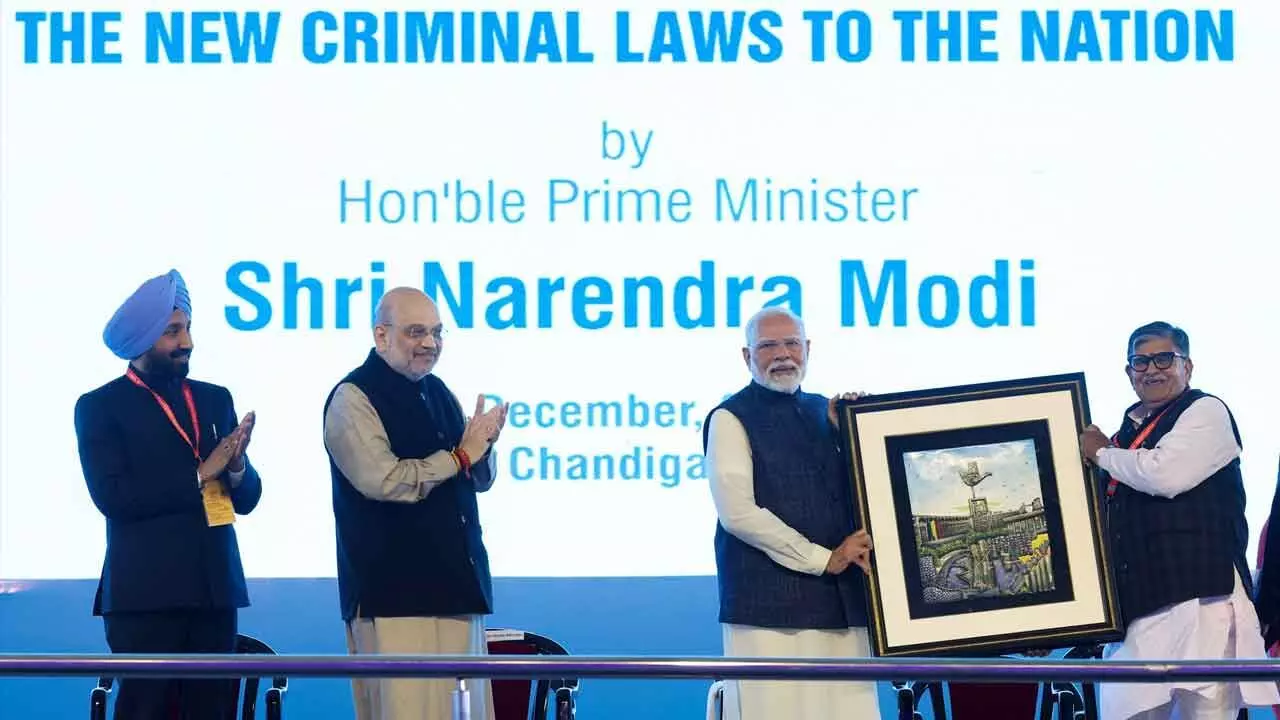New Criminal Laws Are Protector Of Citizen’s Rights, Basis Of Ease Of Justice
Chandigarh first to fully implement new criminal laws
New Criminal Laws Are Protector Of Citizen’s Rights, Basis Of Ease Of Justice

The new laws came into effect at a time when country is moving ahead with the pledge of ‘Viksit Bharat’ and 75 years of adoption of Constitution have been completed, thus the launch of the Bharatiya Nyaya Sanhita, rooted in constitutional values, is a significant occasion - Prime Minister Narendra Modi
Chandigarh: Chandigarh has become the country's first administrative unit where 100 per cent implementation of the three criminal laws has been done with Prime Minister Narendra Modi on Tuesday saying these new legislations are becoming protector of citizen's rights and the basis of ease of justice. The laws -- Bharatiya Nyaya Sanhita, Bharatiya Nagarik Suraksha Sanhita and Bharatiya Sakshya Adhiniyam -- came into effect on July 1, replacing the British-era Indian Penal Code, Code of Criminal Procedure and the Indian Evidence Act, respectively.
Chandigarh has become the country's first administrative unit where 100 per cent implementation of the three laws has been done. Speaking on the occasion, the prime minister said the new criminal laws represent a concrete step towards realising the ideals enshrined in the Constitution for the benefit of all citizens.
He said the new laws came into effect at a time when country is moving ahead with the pledge of "Viksit Bharat" and 75 years of adoption of Constitution have been completed, thus the launch of the Bharatiya Nyaya Sanhita, rooted in constitutional values, is a significant occasion.
He said these laws signify the end of colonial-era laws. The colonial-era laws were the medium of atrocities and exploitation committed by the British when they ruled over India, Modi added. "The 1857 revolution shook the roots of the British rule and in 1860, they brought the IPC and later, the Indian Evidence Act and the CrPC framework came into being. The purpose of those laws was to punish Indians and keep them enslaved," he said.
In 1947, when our country became independent after centuries of slavery, after the wait of generations, after countless sacrifices, when the dawn of independence came, what kind of dreams there were, what kind of enthusiasm there was in the country, he said.
Modi said the countrymen thought that since the British had left, they would also be freed from the British laws. These laws were medium of atrocities and exploitation committed by the British when they ruled. These laws were made when the British regime was ready to do anything to maintain its grip on India, he said.
Modi, however, said it is extremely unfortunate to note that for decades after independence, our laws revolved around the same 'dand sanhita' penal code and the mindset that was used to treat citizens as slaves. From time to time, some little efforts (chote mote sudhar) were made to improve these laws, but their character (of colonial-era laws) remained the same, he said.
According to the government, the new laws aim to make India's legal system more transparent, efficient and adaptable to the needs of contemporary society and also an overhaul of the criminal justice system, bringing in new frameworks to tackle modern-day challenges such as cybercrime and organised crime and ensuring justice for victims of various offences. Modi said said despite gaining freedom, the colonial-era laws which were made to treat citizens as slaves, we never asked this question to ourselves neither those who ruled felt a need to do so. This slavery mindset greatly affected country's progress, he said.

